Its Origin
in the Homeland
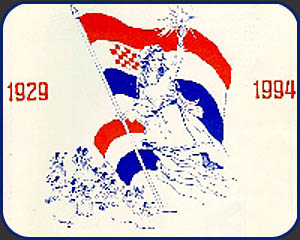 “Croatian
Woman” was founded in 1921, in Zagreb, with
a simple mission: Help Croatians who are in
need and less fortunate. Its roots are directly
tied to a movement that began in the Middle
Ages but strengthened in the 19th Century, a
movement toward goodwill and Christian charity.
Croatia, much like the rest of the Western World,
had a multitude of brotherhoods, fraternities,
and Roman Catholic organizations focused on
philanthropy and altruism spread throughout
the country. After the First World War and the
creation of Yugoslavia, many of the existing
and newly founded organizations began to take
on Croatian-nation-oriented agendas in a direct
response to the installment of the pro Serbian
government and its attempt to erase the national
identity of the Croatian people. Similarly,
women involved in Stjepan Radic’s political
party founded “Croatian Heart” with the same
goals in mind: Helping Croatians who were less
fortunate while also preserving Croatian Catholic
culture. In fact, “Croatian Heart” was the predecessor
to the organization “Croatian Woman,” which
was founded by Maria Kumicic. The first president
to be chosen was Zora pl. Trnski, and her vice
presidents were Ivka barunica Ozegovic and Maria
Kumicic. Being the wives of famous writers and
political figures in Croatia, these women’s
distinguished last names already displayed the
legitimacy of the organization and its ability
to influence the community. Another display
of the organization's legitimacy was its instant
proliferation throughout the country: Petrinje
(July 1921), Osijek (July 1921), Pozega (July
1921), Karlovac (September 1921), followed in
1922 by Jastrebarsko, Sisak, Daruvar, Gospic,
Vukovar, and many other cities.
From the start “Croatian Woman,” as an organization,
was strongly built with a foundation based on
clearly set goals in the cultural and humanitarian
fields. Their goodwill was deeply imbedded,
far-reaching, and felt by many throughout the
world wherever Croatians live and people are
in need. Their work is best exemplified and
stated in the beginning of the organization’s
bylaws, which were written by Slava Furst and
Julka Patriarch, and which were chartered on
May 21, 1921. The bylaws state: “The goal of
the organization is to cultivate a social standard
among Croatian women, which is conducive to
the promotion of social, public, economic, moral
and humanitarian health in both national and
feminist fields.” In order to achieve this,
the women divided the goals into separate categories
and designated four separate branches: cultural,
feminist, humanitarian, and social. Josipa Glembay
wrote this song to illustrate their goals in
Osijek in 1922.
Live work and suffer for your country
For Croatian unity is our only hope
The day is near when we will rejoice
Sing proudly in one voice:
“Condemn evil, cherish freedom —
This is the motto of Croatian women.”
Their unconditional love for their people led
them into many fields which brought them into
conflict with the authorities. In the early
1920s, during the Serbian monarchy, the organization
was banned because of “nationalistic and separatist
activities.” Because of their participation
in the celebration of the famous Croatian activists
Dr. Ante Starcevic and Stjepan Radic, where
over one thousand people gathered, the state
prohibited the existence of “Croatian Woman”
on June 12, 1922. In nearly the same week “Croatian
Woman” in the city of Karlovac suffered the
same fate. The prohibitions, however, were short
lived. Even though the organization was punished
and prohibited because of their love for their
people and their country, they continued their
work with a strong determination. Despite all
of their hard work, the N.D.H. shut down all
existing offices of “Croatian Woman” on May
5, 1943. Twenty two years of humanitarian, cultural,
and patriotic work, which began on Patacickinova
Street, would cease to exist.
“Croatian Woman” in America
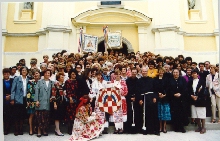 Only
a few years after the foundation of “Croatian
Woman” in Zagreb, its first branch would open
in Chicago. It was the original idea of Agata
Durak and her daughter Vilma Strunjak to start
a woman's organization in Chicago's Croatian
community. She brought this idea to the attention
of Dominican Father Innocent Bojanic at Holy
Trinity Croatian Parish in Chicago. With his
support, “Croatian Woman, Branch No. 1 – Chicago”
was founded on January 27, 1929. Soon the first
meeting was called to order, with the following
women present: Klara Skvorc (first president),
Barbara Balija, Rosalija Kovacevic Kirin, Rosalija
Sedar Vuksanovic, Frances Frkonja, Mary Karacic,
Borislava Absac, Ruza Cesar and Magdalena Guldenpfening.
From the beginning, the women decided that their
main goals would be to help people on both the
cultural and humanitarian levels while also
displaying Croatian culture to the American
people. Immediately, the group was active in
creating exhibits throughout the greater Chicagoland
area. The state of Illinois recognized the importance
of the organization and granted them a legal
charter within the year. Almost instantly twenty
six other branches registered throughout the
country.
During the Thirties and Forties, when war engulfed
the entire world, “Croatian Woman” did all they
could to help. In America and abroad, they worked
with the Red Cross and local hospitals, sending
packages to soldiers and medical aid to the
wounded. They donated time and money to help
their homeland, Croatia, and everyone who was
suffering and in pain. After the war, when Croatian
refugees were scattered all over Europe and
South America, “Croatian Woman” did their best
to accommodate their needs.
After the misfortunes of the war subsided, the
organization returned to one of their original
goals – promoting Croatian culture in America.
In the Midwest, the organization showed great
support for Duquesne University, one of the
first universities to offer the Croatian language,
Croatian folklore and Croatian music as part
of their curriculum. Through this, “Croatian
Woman” was able to help educate a new generation
of Croatians born in America, who needed to
combine the knowledge of two cultures. It was
their goal to teach their children to be proud
both of the United States of America and their
Croatian heritage.
Even in the Fifties, Sixties and Seventies,
when the homeland was isolated by the Iron Curtain
of Communism, “Croatian Woman” found ways to
send food, medicine and financial aid to the
countless victims of flooding and earthquakes.
Meanwhile, Croatian Catholic missionaries worked
hard, combating misery and poverty, to spread
the Christian Faith and love. “Croatian Woman”
does all it can to support these missionaries
and churches.
Activism Over the Last Fifteen Years
Over the last fifteen years “Croatian Woman,
Branch No. 1” has been highly active in Chicago’s
Croatian community. This not-for-profit organization’s
social, humanitarian, cultural and educational
services to this community are magnificent to
say the least. It would be impossible to list
everything that they have done for Croatia and
its Chicago community, so we will attempt to
share only a small portion with you.
In 1988, “Croatian Woman” helped Croatian writers
and activists in Croatia and all over the world.
Their aid toward humanitarian groups and their
leaders is only a continuation of their traditional
work since their foundation in 1921. Even when
Communism’s grasp of the country was the strongest,
the organization helped countless independent
film producers and artists spread the truth
about the Croatian tragedy in Yugoslavia. During
this time they also helped Croatian prisoners
in America and elsewhere with letters, petitions,
and legal counsel.
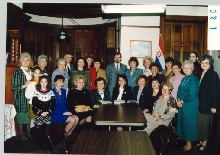 In
1989, the organization celebrated its 60th anniversary
and was honored to receive Dr. Ruzica Cavar
from Croatia as the keynote speaker at their
annual banquet. Dr. Cavar was a human rights
activist with a background in medicine. Her
speech directly challenged the women of Chicago
to get more involved in the democratic process
here and abroad. As a result, the organization
expanded from one hundred to over two hundred
members in the Chicagoland area. The year 1989
also marked the beginning of Croatia’s decision
to secede from Yugoslavia. “Croatian Woman”
was actively involved in materializing the age-old
dream of a free Croatia. From the beginning,
the organization raised funds to help Franjo
Tudjman, the future president of Croatia, and
other political activists despite knowledge
that these figures were blacklisted by the Yugoslav
government, which made any association life
threatening.
In 1990, the organization strengthened its ties
to the Croatian government and its Catholic
Church on the road to freedom, independence,
and a brighter future. While doing so, “Croatian
Woman” never forgot about its obligations to
the poor and sick. An example of this was when
the organization gathered funds to help a group
of blind children who needed expensive surgeries
to see again. That summer the president of “Croatian
Woman” in Chicago, Zlata Ivezic; secretary Milica
Trutin; and treasurer Nevenka Jurkovic traveled
to Zagreb to help set up the revival of “Croatian
Woman” in its homeland. After forty-three years
of absence due to its prohibition in 1943, the
organization made its triumphant return to Zagreb
with the establishment of its startup committee.
In the fall of that same year “Croatian Woman,
Branch No. 1 – Chicago” hosted its first annual
fashion show. The proceeds were immediately
sent to Croatia. In October the president, Zlata
Ivezic, traveled to Croatia to attend the first
ever Assembly of Croatian Women in Zagreb. The
trip was made special when Zlata Ivezic donated
$2,000.00 in the name of “Croatian Woman, Branch
No. 1 – Chicago” and returned the original flag
and coat of arms, two historical artifacts which
had been guarded in Chicago for over sixty years.
In the same year, the organization sent financial
help to coal miners in Tuzla, and the Catholic
charity Karitas in Zagreb. This is also the
year when the board, together with all of its
members, gathered to revise and create a new
set of goals to take “Croatian Woman, Branch
No. 1 – Chicago” into the future. This is a
simplified version of their vision:
• Gathering of humanitarian aid and preparing
containers (40x10 feet) to be sent to Croatia.
• Creating pamphlets, petitions, literature
etc. for promotion of Croatian causes.
• Organizing prayer services and vigils in the
name of world peace.
• Collecting donations.
• Creating fund-raisers.
• Organizing an annual fashion show.
• Organizing bake sales.
• Selling olive branches as a sign of peace.
In the spring of 1991, when Croatia was in the
midst of the political, economic and regional
crisis, the organization sent their first shipment
of humanitarian aid, which would one day amount
to over one hundred containers equaling more
than $10 million in value.
During the same year, when everyone donated
to the Croatian National Fund, “Croatian Woman”
led the way by donating $15,000.00. They also
sent $5,000.00 for medicinal needs and $10,000.00
to wounded soldiers in the escalating war.
As stated before, their activities were not
only humanitarian. “Croatian Woman” also participated
in, and organized many rallies and demonstrations
in attempts to help win the battle for Croatia’s
recognition. It is also important to acknowledge
the local parishes and churches for their help
and public approval and support during this
time.
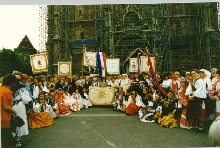 In
1992, Nevenka Jurkovic became president of “Croatian
Woman, Branch No. 1 – Chicago.” Obligations
and activities would also multiply due to the
ever growing need for assistance in wartime
Croatia. The organization helped Prof. P. Cohen
published his book about the tragedies that
had befallen the Jews in Serbia. They also purchased
medical equipment and donated money to wounded
soldiers and other victims of the war. Because
of the growing need for financial aid, “Croatian
Woman” found itself organizing at least one
fund raiser/banquet per month. In March of 1992,
proceeds went to Croatian war invalids. In April,
proceeds went to Croatian orphanages throughout
the country. Later, recognizing the hardships
caused by the Serbian military in eastern Slavonia,
the organization sent $4,500.00 to the besieged
city of Osijek. At the end of the year, “Croatian
Woman” co organized an event hosting as an honored
guest the esteemed U.S. Senator Al D'Amato,
at the Croatian Cultural Center in Chicago.
In 1993, information was released that the first
Croatian embassy would open on American soil
and the organization did their part to help
fund it. In March, after receiving the horrendous
news of massive destruction in the area of Karlovac,
“Croatian Woman” donated $10,000 to its hospital.
In June, a banquet for rape victims of war was
organized with Jadranka Cigelj, herself a victim
of the Serbian-run concentration camps. She
was the main guest speaker. In the same month,
president Nevenka Jurkovic and vice president
Marica Tomacic traveled to Zagreb to attend
the first “Croatian Congress of Croatian Woman”
in Zagreb, while members at home conducted a
simultaneous prayer vigil. This would prove
to be the definitive moment in the revival of
“Croatian Woman” as an international organization
with its roots finally replanted in Croatian
soil.
In a time when history seems to be written and
choreographed by the media, members of “Croatian
Woman”, knowing the importance of information,
sent letters, factual documents, and financial
donations to the Croatian Information Center
in Zagreb.
In November they organized the arrival of the
Croatian National Theatre, famous for their
theatrical performances all over Europe. The
organization also invited and brought to Chicago
Kata Soljic, a mother who lost four sons to
the war, as a guest speaker.
1994 would prove to be a very special year.
Beginning with its anniversary on February 5,
"Croatian Woman, Br. No. 1 Chicago” celebrated
an astounding 65 years of existence. This special
day began at the Croatian Ethnic Institute at
4851 S. Drexel Blvd., followed by Holy Mass
at St. Jerome’s Church in Bridgeport. The celebration
ended at St. Jerome’s banquet hall, where everyone
was honored by the presence of these highly
esteemed guests:
Dragica Pandek, President, “Croatian Woman,
Zagreb”
Mario Nobilo, Croatian Ambassador, United Nations,
N.Y.
Gordana Turic, Croatian Parliament representative,
Zagreb
Anthony Petrusic, President, Croatian Catholic
Union for the U.S. and Canada
Anthony Beric, President, Amcro, New York
Snjezana Franetovic “Croatian Woman, Branch
#32 – Detroit”
Pola Maydak “Croatian Woman Branch #3 – Milwaukee”
Jasminka Corluka "Croatian Woman – Montreal”
Brother Regis and Sister Dora of the Salvatorian
Mission House, New Holstein, Wisconsin
At this same event, “Croatian Woman, Br. #1
– Chicago” published and released its 65th Anniversary
edition, which contained local advertisements
and a brief but concise history of the organization.
Also worthy of mention, are the publications
for the Chicago branch’s 45th, 50th, 55th, and
60th years of existence.
At this time “Croatian Woman” joined the Croatian
World Congress in meetings held in both Cleveland
and Zagreb, and also the Croatian American Congress
in Chicago. Together with the Croatian Catholic
Union and the Croatian parishes of Chicago,
they helped organize the "Action for Life"
annual banquet and which sponsored orphaned
children from Croatia and Bosnia and Herzegovina.
They also organized the Croatian Art Exhibit
in the Chicago State Building which became a
yearly event.
In 1995, special guest Damir Plavsic, president
of HVIDRA (students wounded in war), was present
at the banquet held at the Croatian Cultural
Center which raised $25,000.00 for the wounded
Croatian students. In October, “Croatian Woman”
had its yearly Fashion Show which was special
this year due to the fact that models displayed
Croatian ethnic costumes. The organization also
raised $5,000.00 for the Franciscan monastery
in Konavle, near Dubrovnik. They also donated
$8,000.00 to the “Croatian American Association,”
whose main function is to lobby for Croatian
causes in Washington.
Many people need to be thanked for the success
of “Croatian Woman”: From the countless volunteers
like Milica Trutin and Nina Perovic who individually
helped pack the containers, to the organizations
like the Croatian Catholic Union and the Salvatorian
Mission House in Wisconsin, and all of the Croatian
Parishes in Chicago who actively participated
in this project. In all one hundred containers
filled with over $10 million worth of aid was
sent to various cities in Croatia. These cities
all confirmed arrival and expressed their appreciation:
Zagreb, Rijeka, Mostar, Zadar, Sibenik, Vrlika,
Ljubuski, Klostar Ivanic, Sinj, Osijek, Djakovo,
Imotski, Karlovac, Vinkovci, Poljica kod Omisa,
Sestanovci Katuni, Posusje, Split, Siroki Brijeg,
Makarska, Dubrovnik, Slavonski Brod, Vrgorac,
Tomislav Grad, Gabela Polje Metkovic, and Capljina,
including different groups in Croatia, Bosnia
and Hercegovina.
“Croatian Woman” also gave a helping hand to
social groups here in Chicago area, such as
Mercy Home, Children's Memorial Hospital, and
Misercordia etc.
In 1996, “Croatian Woman” held their 67th anniversary
banquet at the Croatian Cultural Center in Chicago,
raising money for political prisoners and their
families in the U.S. In May, they organized
an emotionally touching exhibit at DePaul University
which displayed the art work of children who
had witnessed and survived the atrocities of
the war against Croatia. That same year in October,
their fashion show raised $25,000.00 for the
Dubrava Center in Zagreb for handicapped children
and young adults. They also raised $4,000.00
for the Croatian Cultural Center in Vukovar
to help rebuild the devastated city.
In 1997, the annual banquet brought to Chicago
special guests Cardinal Vinko Puljic, the archbishop
of Sarajevo; Mrs. Ljilja Vokic, the Minister
of Education and Sports in Croatia; and her
assistant, Mrs. Vlasta Sabljak. In June, “Croatian
Woman” helped to organize an art exhibit featuring
the works of the famous naive artist Ivan Lackovic
which were displayed in the halls of the Croatian
Ethnic Institute in Chicago. They also gave
another $1,000.00 to the Croatian American Association.
1998 proved to be another noteworthy year. Of
the many actions taken, the most notable was
the donation of $30,000.00 to the University
of Mostar. They also co organized an exhibit
honoring Cardinal Alojzija Stepinac on the 100th
anniversary of his birth. They also helped sponsor
a book by Dr. Ante Cuvalo titled The Historical
Dictionary of Bosnia and Hecegovina, which was
sent to the libraries of all major universities and
many government officials.
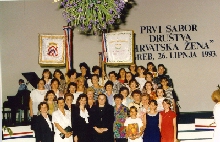 In
January, “Croatian Woman” joined several other
organizations in their support for “Friends
of Vukovar” and donated $3,000.00 to help rebuild
their center for handicapped children. In June,
they organized the book signing of “Healing
the Heart of Croatia.” Present at the Croatian
Cultural Center were the authors – Fr. Joseph
Kerrigan and world-renown pediatric heart surgeon
Dr. William M. Novick. Dr. Novick is a professor
at the University of Tennessee and also the
medical director of the “International Children's
Heart Foundation.” Together with Fr. Kerrigan,
a Catholic Priest at the Cathedral of the Immaculate
Conception in Tennessee, the two traveled to
Zagreb and saved the lives of countless children
from certain death.
On February 6, 1999 the 70th anniversary celebration
of this organization was held at the Croatian
Cultural center. Among the many guests present
at this event was the president of Croatian
Woman in Zagreb, Mrs. Dragica Pandek, vice president
Zlata Horvatic, and Croatian parliament representative
Gordana Turic. The presence of Dr. William Novick,
the well-known children’s heart surgeon from
the University of Tennessee in Memphis was especially
significant for this event. The profit from
this anniversary celebration was sent to Rebro
hospital in Zagreb to help children with heart
defects and to purchase heart monitors. On Palm
Sunday of the same year, the members sold olive
branches in front of our Croatian churches to
help raise funds for upcoming events. In the
fall of the same year another successful fashion
show was held at William Tell hotel. Funds raised
from this event were used to purchase incubators
for the children’s hospital in Split. Aside
from humanitarian work, the organization supported
cultural events, such as bringing two actors
from Croatia, Helen Buljan and Dubravka Miletic,
who put on a comedy at St. Jerome’s parish hall.
In 1999, Croatian Woman also helped the Combaj
family by being Godparent to the family’s 11th
child.
The new millennium began with a concert whose
performer was Drazen Zanko, a well-known Croatian
singer. His concert was held on January 29th
at St. Jerome’s parish hall and funds raised
from the concert were sent once again to the
children’s hospital in Split. The traditional
fashion show was different in 2000 because the
fashions presented were by Gordana Radic, a
well-known Croatian designer who came from Croatia
to introduce her wonderful clothing line. The
event was held on October 22nd at the Holiday
Inn hotel and was quite successful. The proceeds
from this event were sent to Mostar (to purchase
gastroscopes).
2001 began with another cultural event. The
organization assisted in promoting the book
by Julianne Busic, “Lovers and Madmen,” which
tells the life story of Julianne and Zvonko
Busic and their fight for a free Croatia. On
April 4th of the same year, the traditional
Palm Sunday luncheon was held. Proceeds were
sent to Croatian families in Knin through St.
Anthony’s charity. On October 21st of the same
year, the annual fashion show was held and it
was especially successful. It was held at the
Croatian Cultual Center for the first time and
all proceeds were sent to help the families
of the victims of the September 11 tragedy in
New York. The donation was sent through the
Catholic charities.
In 2002 two very big events took place, the
first was the Palm Sunday luncheon on March
24th. Proceeds from this event were sent to
assist the city of Vukovar. The honored guest
for this event was Maja Freundlich from Zagreb,
who is a well-known writer. The other big event
to take place was the annual fashion show on
October 20th, which was held at Royalty West
Hotel.
In 2003, the Palm Sunday luncheon and very successful
fashion show were held at the Croatian Cultural
Center. Proceeds from these events were sent
to Croatia. Over 450 guests attended the fashion
show, that being the biggest and most successful
show.
The year 2004 was busy with several activities.
The Palm Sunday luncheon gathered Chicago Croatians
who once again showed their generosity to those
in need. And on September 12th, the organization
held a banquet to assist Ante Ljubas, who was
released from prison after 23 years.
The banquet was held at St. Jerome’s parish
hall and many guests were present. The fall
fashion show was held at the Croatian Cultural
Center on October 24th and the proceeds were
sent to Kiseljak to assist in building a day-care
center, run by Franciscan sisters. Neven Jurica,
the ambassador from Croatia, came from Washington
D.C. to attend this event.
In the five years before it turned 75, “Croatian
Women” demonstrated great vitality, as a summary
of some of its accomplishments shows: assisting
Croatian prisoners, radio clubs, the Croatian
American Association, the Croatian parishes
in Chicago, organizations for Croatian studies
in America, a children’s hospital in Chicago,
many families in need in Zagreb, Split, Jajce,
Vukovar, etc., day-care centers, charities,
cultural performances, building of memorials
in Croatia, purchasing of medical equipment
for hospitals in Zagreb, Split and Mostar, helping
poor Croatian students, printing a book about
Croatia, supporting a symposium about Vukovar
in Washington D.C., purchasing property for
Croatian refugees in Knin, helping families
of the 9/11 tragedy in New York, and many other
projects which are too many to list.
November 27, 2004, a grand celebration of the
75th anniversary of the organization’s existence
was held in St. Jerome’s parish hall, featuring
the main guest, Fr. Zlatko Spehar, the Franciscan
Superior from Vukovar. All of the proceeds from
this event went to help the children of Vukovar.
The newly appointed Consul to Chicago of the
Republic of Croatia, Ms. Zorica Matkovic, was
also a guest. Fr. Marko Puljic, Custos of the
Croatian Franciscans, led the prayers. Representatives
from all of the Croatian parishes were in attendance.
For Christmas of that year, help was sent to
families in need: the Domazet family, to build
a house (Muc); the Ivan Cuvalo family, for medical
help for their child (Ljubuski); the many members
of the Drago Radica family (Slavonski Brod).
Donations collected in 2004 and sent to the
needy were in the amount of $62,780.00.
The year 2005 saw the continuation of the same
love and enthusiasm. Early in the year, on March
5, a benefit luncheon was held at St. Jerome
Parish for former Croatian prisoner Ranko Primorac.
A few weeks later the traditional philanthropic
luncheon on Palm Sunday, March 20, took place
for the benefit of a Mostar hospital’s purchase
of an ambulance, as well as for the children’s
hospital in Rijeka. On May 15, together with
all of Chicago’s Croatian parishes, the society
organized a memorial gathering in observance
of the 60th anniversary of Bleiburg and the
tragedy of the “Krizni Put” (the way of the
cross traveled by Croatians tortured by the
Partizans). The fall fashion show was held at
the William Tell Hotel, with fashion creators
from Croatia, featuring Jadranka Segota, a designer
from boutique “Rafaela.” The entertainment was
provided by the legendary Kico Slabinac and
Trio Rio. Revenue from this event went to help
victims of Hurricane Katrina, and to the hospital
in Hvar for the purchase of medical equipment.
The total amount raised by the society in 2005
and given to charitable causes was $52,000.00.
The first half of 2006 was dedicated to helping
needy children. Namely, on Palm Sunday, April
6, the annual benefit luncheon held at the Croatian
Cultural Center in Chicago, helped two children’s
centers: “Egipat Children’s Home” in Sarajevo,
and the pre-school in Kiseljak. In fall of this
year a collection was taken to help the Migic
family, who returned to Croatia. The annual
fashion show was held on October 22, at the
Croatian Cultural Center in Chicago, featuring
young people from our community as models. The
proceeds from this event were sent to a hospital
in Split and one in Osijek. Money raised during
the year totaled $34,830.00.
The year 2007 began by marking and recalling
once again the events at Bleiburg. At the annual
Palm Sunday luncheon on April 1, the society
organized a collection of donations to establish
a sacred space at Bleiburg. The response of
the Croatian people of our community was truly
fantastic. This was a proud occasion for the
Croatian community of our city. The yearly fall
fashion show was held at Ashton Place Hotel.
For the first time, the society presented fashions
from the famous Lord & Taylor store. Proceeds
from this event went to help the health center
in Slunj. A donation was also sent to the chapel
in Vukovar, and to the Tomic family of 11 children
in Slavonski Brod.
Total funds raised during this year reached
the fantastic sum of $68,330.00.
Last year, 2008, the work of the society continued
with the same zeal. The traditional Palm Sunday
luncheon, held at the Croatian Cultural Center
in Chicago, provided help to families in trouble
and need by sending the money raised by the
event to a special police association in Gospic.
In the fall, the annual fashion show took
place on October 19, at the Holiday Inn North
Shore in Skokie under the title of “Traditional
in Contemporary.” This one was different from
all preceding fashion shows. It was presented
by guests from Zagreb lead by Mr. Josip Forjan
of the Zagreb shop for renting and making
national costumes. The guests were sponsored
by the city of Zagreb with the help of the
Director of Culture, Pavle Kalinic. All of
this, however, would not have been possible
without the indispensable help of the Croatian
Consul, Zorica Matkovic. Funds raised by this
event were sent to St. Joseph the Worker home
for the elderly in Ljubuski, an institution
run by nuns. The primary purpose of this charitable
donation was to install a heating system,
something the home has never had. Funds also
went to the preschool “Pcelice” in Livno,
and to Elizabet Lepinski, a grandmother caring
for her orphaned grandchild. Funds raised
this year totaled $48,000.00. At the end of
this year, on the coldest December Sunday
in the history of Chicago, the “Croatian Woman,
Branch #1” organization sponsored a special
gathering in honor of the release of Croatian
prisoner Zvonko Busic. This occasion marked
the end of the year and the end of another
chapter in the history of this noble organization
that so unselfishly came to the aid of a Croatian
prisoner.
In the last 4 years alone, this society raised
funds and sent help in the amount of $266,000.00
to the needy. Although the members of this
group never speak about this accomplishment,
it is nonetheless worth mentioning the amount
of donations that enabled the organization
to make easier the lives of many who suffer.
It is apparent that this exceptionally worthy
organization of Croatian women in Chicago
bravely wrote their own history through volunteer
actions and heart-felt love. Their support
for all things related to love, humanity,
culture, and the Croatian identity must be
recognized and honored. These past times of
hardship and years of labor are testament
to the fact that through times of Croatian
tragedy and persecution, Croatian women and
mothers, wherever they might be, will always
keep their hearts full of love and their eyes
full of hope. Hopefully young women and wives,
here in America and in Croatia, will recognize
the importance of what their mothers and grandmothers
established through blood, sweat and tears
over many decades of work, and realize that
the 21st Century will only be as beautiful
and rewarding through the same volunteer labor
and heart-felt love, which is exemplified
in the Croatian Woman’s motto, “It is good
to do good.”
Fr. Jozo Grbes
Back Click here to select last tab Forward
|